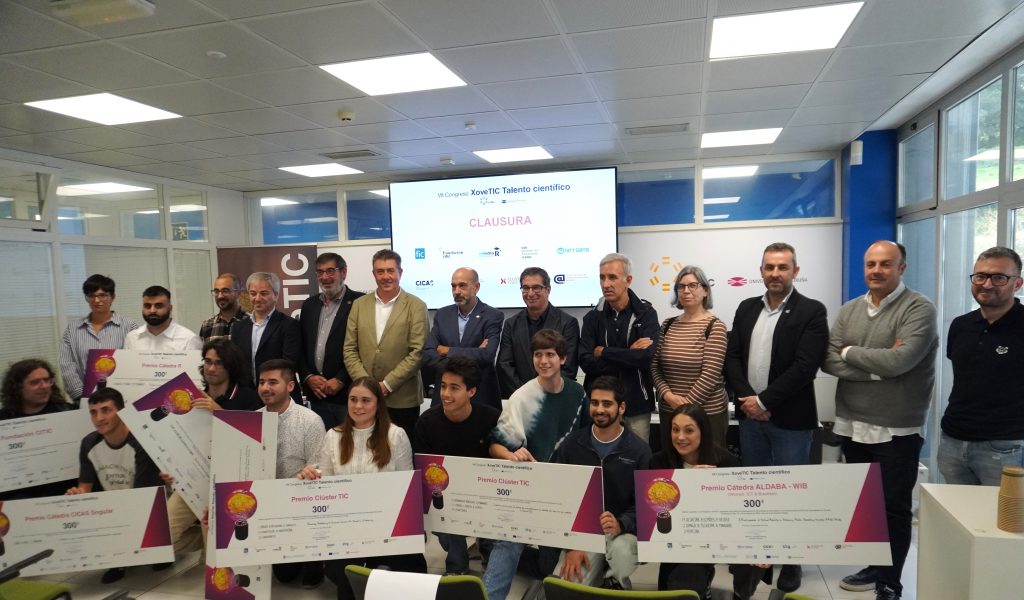
The seventh edition of the XoveTIC Congress concludes with a 48% increase in the number of submitted papers.
- CITIC of UDC, which organized the event, hosted the awards ceremony on Friday, presenting nine prizes that recognize the best research contributions.
- The 74 research projects submitted reflect the interdisciplinary nature of ICT and their impact on diverse sectors such as sports, health, education, and cultural preservation, highlighting the potential of these technologies to transform and improve various aspects of society.
A Coruña, October, 18, 2024.- The VII XoveTIC Congress, organized by the Research Center for Information and Communication Technologies at the University of A Coruña, concluded on Friday with an awards ceremony after two days of intense activity. This year, the event experienced notable growth, with a total of 74 papers submitted compared to 50 in the previous edition, representing a 48% increase from last year. The participation of 120 junior researchers solidified the congress as a key forum for exchanging ideas and presenting advancements in the field of ICT.
During the closing ceremony, nine awards were presented to recognize excellence in the most outstanding contributions to the congress. Each award carries a monetary grant of 300 euros. The CITIC Foundation Award was given by the Scientific Committee that evaluated the submitted projects, while the Cluster TIC Galicia Awards for the best poster and the best oral communication were selected through a popular vote among attendees. The winners are as follows:
- Best Oral Communication: Lara Pallas Quintela, Ángel Regueiro, Carlos Dafonte, Minia Manteiga, Raúl Santoveña, and Daniel Garabato for “Removing Reddening to Enhance Gaia’s XP Spectra Clustering.”
- Best Poster: Santiago Fernández-Noriega Balseiro, Iago Fernández Garrido, Jerónimo José Pardo Rodríguez, Laura Nieto Riveiro, Ángel Gómez, and María Martínez Pérez for “CuidaconTIC: Captura y utilización de datos de wearables para la calidad de vida en los cuidados.”
- CITIC Foundation Award: Awarded to María González and Hiram Varela for their research on “Simulation of fluid flow through composite materials.”
- CICAS-Sngular Award: Eliseo Bao, Ángel Pérez, and Javier Parapar for their work titled “Adapting Large Language Models for Underrepresented Languages.”
- ITG – ARQA Award: For the paper “Implementation of a User Anonymity Application using a Privacy-Preserving Entropy-as-a-Service with Quantum Security” by Iván Cillero Seijas, David Soler García, Francisco Javier Nóvoa Manuel, José Carlos Dafonte Vázquez, Ana Fernández Vilas, and Manuel Fernández-Veiga.
- R Chair Award: For Pedro García Cereijo, Paula Fraga Lamas, and Tiago M. Fernández Caramés for their research titled “Secure Storage System Using IPFS and Oracles for Decentralized Applications Based on Blockchain.”
- ALDABA-WIB Chair Award (Women, ICT & Business): For the work “Effectiveness of Virtual Reality in Reducing Public Speaking Anxiety: A Pilot Study” by María Oliveira, Raquel Simões de Almeida, Paulo Veloso Gomes, João Donga, Bruno Teixeira, António Marques, and Javier Pereira.
- NTT Data Chair Award: Lucas Alonso de Sano Segundo and Adriana Dapena for their work titled “Tablet Application for Working on Routines, Humor, and Understanding Emotions through Various Games in Individuals with ASD.”
- CPEIG Award: Jorge Paz Ruza, Alex A. Freitas, Amparo Alonso Betanzos, and Bertha Guijarro Berdiñas for “Positive Learning without Labels to Identify New Genes Related to Dietary Restriction.”
The closing ceremony featured various authorities, including Jerónimo Puertas Agudo, Vice-Rector for Research and Transfer at the University of A Coruña; Antonio del Corral, representing Cluster TIC Galicia; Juan Ignacio Borrego, Councilor for Education, Training, and Technological Innovation of the A Coruña City Council; Mariano Javier Cabrero Canosa, Dean of the Faculty of Computer Science at UDC; and Javier Pereira Loureiro, Deputy Director of CITIC.
Topics Addressed
Through 46 oral presentations and 28 posters, the congress covered a wide range of current topics within the ICT field. Among the subjects discussed were advancements in artificial intelligence applied to sports data analysis, immersive technologies for training in complex environments, and the use of digital tools to enhance the quality of life for individuals with special needs. Key issues such as the preservation of minority languages through natural language processing models and the development of new methodologies based on machine learning applied to areas like digital health and biotechnology were also addressed.
These investigations reflect the interdisciplinary nature of ICT and their impact on diverse sectors such as sports, health, education, and cultural preservation, highlighting the potential of these technologies to transform and improve various aspects of society.
Strong Participation
The VII XoveTIC Congress was a success in both participation and the quality of contributions. The organizers emphasized the increase in the number of submissions, as well as the high level of the presented research. The congress also consolidates its role as a fundamental space for the training of emerging researchers and the promotion of collaboration between academia and the business sector, fostering knowledge transfer and technological innovation.





